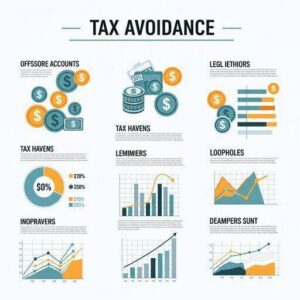In order to write a comprehensive blog post on tax avoidance, I need to gather some factual information first. I will focus on understanding what tax avoidance is, common methods, the difference between avoidance and evasion, its ethical and legal implications, and its impact.
Here are the queries I’ll use:
. What are common methods of tax avoidance?
. What is the difference between tax avoidance and tax evasion?
. What are the legal and ethical implications of tax avoidance?
. What is the impact of tax avoidance on government revenue and public services?
. Tax avoidance strategies and examples
. Legality of tax avoidance
. Ethical debate on tax avoidance
. Impact of tax avoidance on economy
Tax avoidance is a multifaceted issue that sits at the intersection of law, ethics, and economics. Often confused with tax evasion, it represents a distinctly different approach to managing tax liabilities. While one is legal, the other is not, yet both have significant implications for individuals, businesses, and the broader society.

Understanding Tax Avoidance: A Legal Maneuver
At its core, tax avoidance involves using legal means to reduce or minimize one’s tax burden. It’s about taking advantage of the legitimate provisions, loopholes, deductions, credits, and incentives within the existing tax laws to pay the least amount of tax legally possible. Governments often design tax codes with specific objectives in mind, such as encouraging certain behaviors (e.g., saving for retirement, investing in particular sectors, or purchasing homes) by offering tax breaks. Tax avoidance, in its benign form, involves utilizing these intended provisions.
Common methods of tax avoidance include:
Claiming legitimate deductions and credits: This is perhaps the most straightforward form of tax avoidance. Individuals and businesses can reduce their taxable income by claiming deductions for expenses like home mortgage interest, charitable donations, or business operating costs, and by utilizing tax credits for education, energy-efficient upgrades, or dependent care.
Investing in tax-advantaged accounts: Retirement accounts like 401(k)s or IRAs, and certain investment vehicles, offer tax deferral or tax-exempt growth, allowing individuals to reduce their current taxable income or avoid taxes on investment gains.
Utilizing tax-efficient structures: Businesses might establish specific corporate structures or legal entities to optimize their tax position. This can involve setting up subsidiaries in jurisdictions with lower tax rates or using transfer pricing strategies to allocate profits strategically among related entities, albeit within legal boundaries.
Timing of income and expenses: Individuals and businesses can strategically time the recognition of income or expenses to push them into different tax years, potentially benefiting from lower tax rates or maximizing deductions.
Leveraging ambiguities in tax law: This is where tax avoidance can become more aggressive. Taxpayers or their advisors might interpret complex tax laws in a way that is most favorable to them, even if the interpretation wasn’t explicitly intended by the lawmakers.
Tax Avoidance vs. Tax Evasion: The Crucial Distinction
The fundamental difference between tax avoidance and tax evasion lies in their legality.
Tax Avoidance: This is legal . It involves navigating the tax system within the confines of the law to reduce tax liability. While some forms might be considered “aggressive” or against the “spirit of the law,” they do not involve breaking the law.
Tax Evasion: This is illegal . It involves deliberately misrepresenting or concealing information to avoid paying taxes that are legally owed. Examples include under-reporting income, overstating deductions, hiding assets in offshore accounts without declaring them, or engaging in fraudulent activities. Tax evasion is a criminal offense and can lead to severe penalties, including hefty fines and imprisonment.
The line between aggressive tax avoidance and illegal tax evasion can sometimes be blurry, leading to legal challenges and interpretations by tax authorities and courts. This “grey area” often involves complex financial instruments and sophisticated schemes designed to exploit loopholes that lawmakers may not have anticipated.
Ethical and Legal Implications
While legally permissible, tax avoidance, especially its more aggressive forms, raises significant ethical questions. Many argue that while within the letter of the law, such practices go against the “spirit” of the law, undermining the principle of a fair contribution to society. Companies, in particular, face scrutiny for engaging in practices that shift profits to low-tax jurisdictions, raising concerns about their social responsibility. The ethical debate often centers on the idea that companies and wealthy individuals have a moral obligation to contribute their “fair share” to the public good, regardless of whether a legal loophole exists.
Governments worldwide are increasingly introducing measures like General Anti-Avoidance Rules (GAAR) to combat aggressive tax avoidance schemes that are technically legal but are designed purely to avoid tax, without any genuine commercial purpose. This demonstrates a global effort to curb practices that, while not explicitly illegal, are deemed undesirable due to their impact on public finances.
The Impact of Tax Avoidance on Society
The consequences of widespread tax avoidance are far-reaching:
Reduced Government Revenue: The most direct impact is a significant loss of revenue for governments. This lost income could otherwise be used to fund essential public services such as healthcare, education, infrastructure development, social welfare programs, and national defense.
Increased Burden on Honest Taxpayers: When some individuals and corporations legally minimize their tax contributions, the burden often shifts to compliant taxpayers, who end up paying a disproportionately larger share to maintain public services. This can lead to a sense of unfairness and resentment among the general public.
Distortion of Economic Activities: Tax avoidance can distort economic decisions. Businesses might make investment and operational choices based on tax considerations rather than genuine economic fundamentals, potentially leading to inefficient allocation of resources and impacting fair competition.
Undermining Public Trust: Aggressive tax avoidance practices erode public trust in the fairness and integrity of the tax system. This distrust can lead to reduced tax compliance overall and a less stable economic environment.
Impact on Developing Nations: Developing countries are particularly vulnerable to corporate tax avoidance, as their economies often rely more heavily on corporate income tax. The loss of this revenue can severely hamper their ability to fund development initiatives and alleviate poverty.
In conclusion, while tax avoidance operates within the boundaries of the law, its aggressive forms pose considerable challenges to tax authorities and raise complex ethical dilemmas. Striking a balance between allowing individuals and businesses to manage their finances efficiently and ensuring a fair and sustainable tax system remains a critical global challenge. As tax laws evolve and become more complex, so too do the strategies employed for tax avoidance, requiring continuous vigilance and adaptation from both taxpayers and governments.
You can approach for Taxation or Business related services at https://taxaccountant.pk/.















